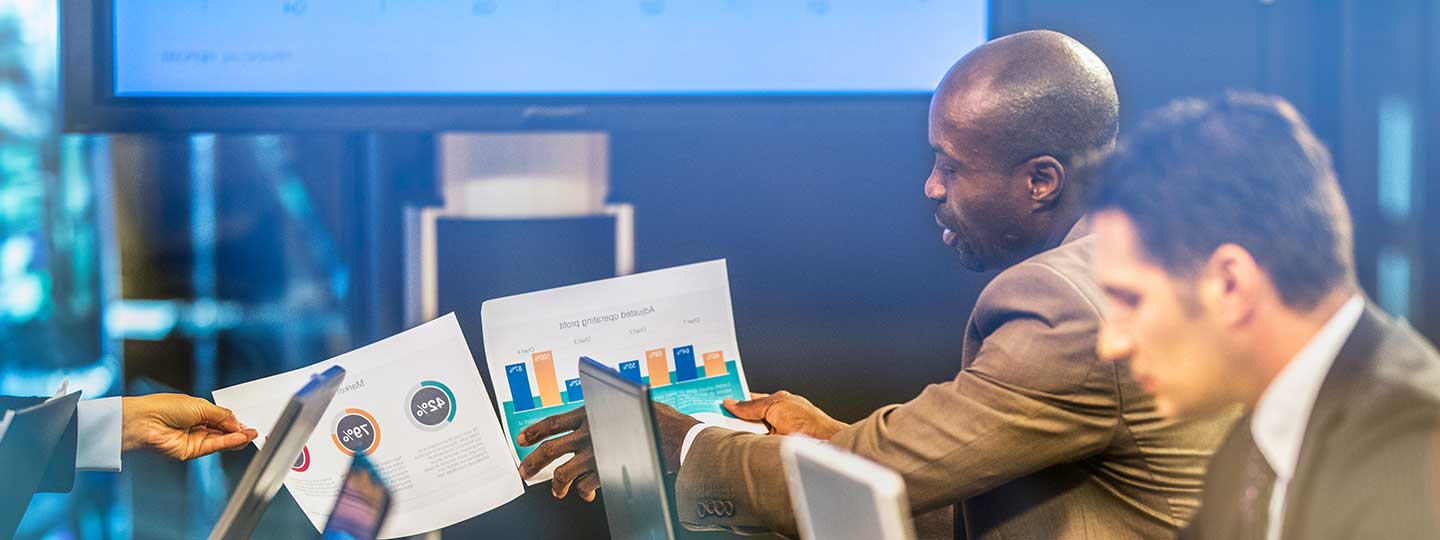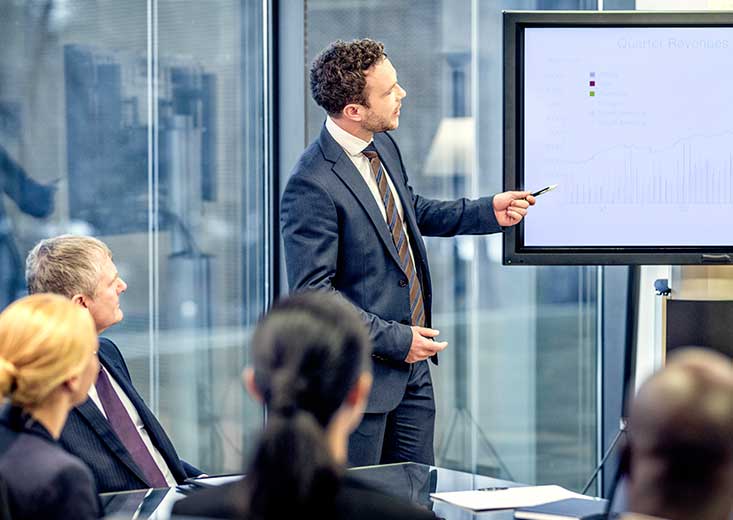Master of Accountancy: Forensic Accounting Specialization

Fight fraud with accounting expertise.
Learn More Today
Complete the form to get additional information about this program.
- Duration 12 months
- Cost per Credit $895
- Credit Hours 30
Program Benefits
- Prepare for CPA licensure and the CFE exam
- Learn from CPA-certified industry experts and experienced field practitioners
- Macc Bridge options available for non-accounting majors and no application fee

[MUSIC PLAYING]
DOUGLAS BOYLE: One thing that’s very unique about our online program is we didn’t force fit a program that we already had to the online format. We designed our program completely with the practitioner in mind. We put together a council of partners who work in public accounting, and many of them work at the big four and other firms. And that council is really working hand in hand with us on curriculum development, on mentoring our students, and providing them with the skill sets that they need to be successful.
To have a good online experience, it’s not just the faculty talking, but it’s really your peer group and your fellow students. And my experience has been our program attracts students of that caliber.
DANIEL MAHONEY: We place an emphasis on the development of interpersonal skills, whether interacting with colleagues at the firm or our clients. Another one of the key goals and objectives of our program is the development of strong ethical skills within the individual.
DOUGLAS BOYLE: A lot of our students are going to be pursuing the CPA exam, so we really want to develop them in areas that are going to help them succeed in their career. It’s not just a public accounting focused program. It’s also what it would take to advance your career through the private ranks up to titles like controllers and CFOs.
DANIEL MAHONEY: A student who has a particular interest in the area of forensic accounting might find it appealing that, within our program, we do offer three very specialized courses in that area. The certified fraud examiner focuses on the detection and deterrence of fraud in general.
DOUGLAS BOYLE: As folks rise up the ranks in accounting, to have really strong ethics and to have really strong networks and to have really strong interpersonal skills is absolutely critical and vital. So really, that ties in perfectly with our Jesuit mission because here at the University of Scranton, we’ve always taught those things.
[MUSIC PLAYING]
Earn a Valuable CFE Credential
In 2018, 44 percent of those surveyed by the Association of Certified Fraud Examiners (ACFE) reported they were increasing their budgets to fight fraud.3
Every year, companies lose 5 percent of their revenue to occupational fraud, amounting to global losses of $4 trillion.1 In addition, the FBI has designated corporate fraud as one of its highest priorities.2
Get the skills to counteract this white-collar crimewave with Scranton’s Forensic Accounting specialization and enter the field in high demand.
Our Forensic Accounting specialization prepares you to meet this growing demand and harness dual expertise in accounting and forensics to protect vital assets.
Gain the skills you need to prepare for CPA licensure*,** and the Certified Fraud Examiner (CFE) exam offered by the world-renowned ACFE.
You’ll learn directly from faculty who are CPA-certified industry experts and experienced field practitioners. The University of Scranton’s Master of Accountancy is entirely online and designed to fit your life.
“Fraud risk assessments are the first step in preventing fraud before it takes root.”– PricewaterhouseCoopers, Global Economic Crime and Fraud Survey, 20183
Career Outlook: A Wide Variety of Paths
The Forensic Accounting specialization opens up career paths in auditing, governance, compliance and risk management, and public and private-sector investigations.
The median salary for forensic accountants — one of many relevant career paths — is $104,500, while the top 25 percent earn as much as $147,500.4 CFE-certified forensic accountants earn up to 31 percent more than their un-credentialed peers.4
As a forensic accountant, you might work closely with law enforcement institutions, provide courtroom testimony, look for inconsistencies in financial statements, conduct advanced audits, and more.
View Career OutlookCurriculum: State-of-the-Art Skills
This specialization gives you a choice between five electives in topics such as advanced auditing, financial statement analysis, and occupational abuse.
Our Forensic Accounting courses are continually reviewed by our Accounting Department Professional Alumni Council, so you learn the latest techniques for preventing and detecting fraud.
Gain an education housed within The University of Scranton’s AACSB-accredited Kania School of Management and founded in Jesuit principles of ethics and integrity.
Master of Accountancy CurriculumProgram Outcomes: CPA Preparation
The Master of Accountancy prepares you to:
- Apply extensive, practical knowledge in the field of accounting
- Use advanced approaches to leverage accounting as a means of solving business problems
- Employ skills needed for identifying and navigating red flags that could indicate occupational fraud
- Analyze accounting information to disseminate value-added insights for the firm to make effective economic decisions
- Understand the global environment and critical leadership roles that are associated within the broader business environment
- Demonstrate effective and advanced communication skills to key stakeholders within and outside of the firm
You’ll complete this program with the robust accounting knowledge you need to take the CPA exam.*,**
Available Specializations
You may also focus your degree with a specialization in Accounting Analytics or pick any five electives, out of 16 available courses, to tailor your degree to your interests.
Admissions Requirements
To apply for the Master of Accountancy, you’ll need:
- Completed application (no application fee required)
- Undergraduate GPA of at least 3.0 on a 4.0 scale
- Bachelor’s degree in accounting or non-accounting business bachelor’s degree (Bridge courses may be required)
- Official transcripts from all previously attended colleges and universities
- Résumé
- Personal statement
- Two letters of reference from someone with whom you have an academic or professional relationship
- MAcc Academic Honesty Certification and Agreement Form
Students with a non-accounting business bachelor’s degree may still apply through the MAcc Bridge option, which offers pre-requisite courses in accounting and finance.
Find more details on the Master of Accountancy’s Admissions Requirements page.
Admissions InfoTuition Details
The Master of Accountancy program at The University of Scranton consists of 30 credit hours and costs $895 per credit hour.
We strive to provide you with an affordable, high-quality education. That’s why we’re ranked a Best Value School, Regional Universities North, by U.S. News & World Report for 2020.
See TuitionFaculty: Support From Industry Pros
The University of Scranton’s CPA-certified faculty are more than industry experts.
They’re also working practitioners and consultants with a long list of award-winning publications. These experienced professionals will work with you directly and provide support as you earn your master’s degree.
You’ll also benefit from the close advisement and mentorship of Scranton alumni, our partners at Big 4 accounting firms, and Scranton’s Accounting Department Professional Alumni Council.
Faculty at ScrantonEarn a degree without interrupting your career. You’ll be part of an online learning community led by a diverse and expert faculty. Online programs reflect the same rigorous standards as our on-campus programs.
Scranton OnlineFinancial aid options are available to help you pay for your education. A personal financial aid counselor will assist you in identifying and taking full advantage of all opportunities.
Financial Aid DetailsFrequently Asked Questions
If you have a question we don’t cover here, request more information or call 866-373-9547.
The online Master of Accountancy program accepts up to six transfer credits with program director approval. To learn more about credit transfers, request more information or call us at 866-373-9547.
You can complete the online Master of Accountancy program in 18 months. To see the curriculum, view our courses page.
Yes, the online Master of Accountancy program offers two specializations, including Forensic Accounting and Accounting Analytics. You may also select any five electives — out of 16 available courses — to tailor your degree to suit your interests. Learn more about the curriculum for this program here.
The University of Scranton has six start dates throughout the year. To find out when the next start date is, call 866-373-9547 or email.
Sources:
- Association of Certified Fraud Examiners (2018). Report to the Nations: 2018 Global Study on Occupational Fraud and Abuse. Retrieved November 22, 2019, from https://s3-us-west-2.amazonaws.com/acfepublic/2018-report-to-the-nations.pdf.
- Federal Bureau of Investigation (n.d.). White-Collar Crime. Retrieved November 22, 2019, from https://www.fbi.gov/investigate/white-collar-crime.
- PricewaterhouseCoopers (2018). Pulling Fraud Out of the Shadows: Global Economic Crime and Fraud Survey 2018. Retrieved November 22, 2019, from https://www.pwc.com/gx/en/forensics/global-economic-crime-and-fraud-survey-2018.pdf.
- Association of Certified Fraud Examiners (n.d.). Career Path – Forensic Accountant. Retrieved November 22, 2019, from https://www.acfe.com/career-path-forensic-accountant.aspx.
Footnotes:
*The University of Scranton accounting program also meets the NYS CPA license education requirements as an “Equivalent to a NYS Licensure Qualifying Registered Program.”
**Many states require 150 semester hours of education within a prescribed accounting coursework curriculum for obtaining the CPA license. Students without prior accounting and related coursework are unlikely to meet this requirement through completing the MAcc program. Such students may need to complete additional required course(s). Please refer to your individual state’s requirements.